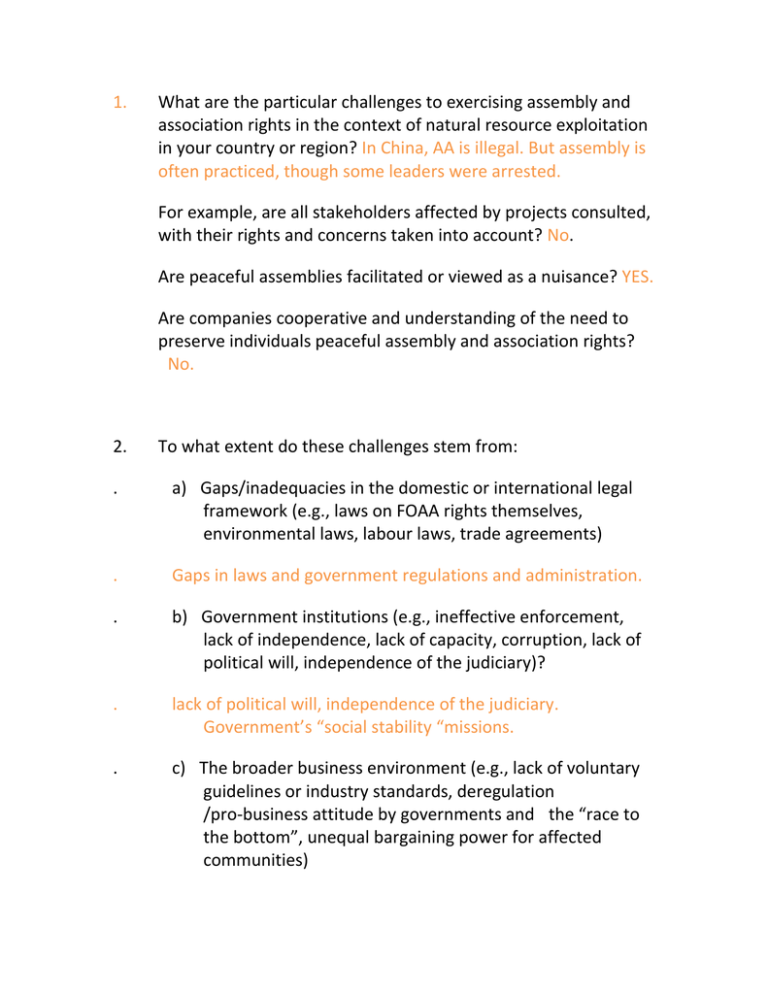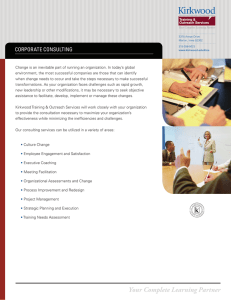
1.
What are the particular challenges to exercising assembly and
association rights in the context of natural resource exploitation
in your country or region? In China, AA is illegal. But assembly is
often practiced, though some leaders were arrested.
For example, are all stakeholders affected by projects consulted,
with their rights and concerns taken into account? No.
Are peaceful assemblies facilitated or viewed as a nuisance? YES.
Are companies cooperative and understanding of the need to
preserve individuals peaceful assembly and association rights?
No.
2.
To what extent do these challenges stem from:
.
a) Gaps/inadequacies in the domestic or international legal
framework (e.g., laws on FOAA rights themselves,
environmental laws, labour laws, trade agreements) .
Gaps in laws and government regulations and administration.
.
b) Government institutions (e.g., ineffective enforcement,
lack of independence, lack of capacity, corruption, lack of
political will, independence of the judiciary)? .
lack of political will, independence of the judiciary.
Government’s “social stability “missions.
.
c) The broader business environment (e.g., lack of voluntary
guidelines or industry standards, deregulation
/pro-business attitude by governments and the “race to
the bottom”, unequal bargaining power for affected
communities)
.
.
pro-business attitude by governments, unequal bargaining
power for affected communities.
d) Businesses themselves (e.g., focus on profits over rights, lack of
interest in consulting local communities, willingness to
leverage government corruption) focus on profits over rights, lack of interest in consulting local
communities, willingness to leverage government corruption
.
e) Any other factors Government often use police or military force to solve problems.
3.
What type of action should be taken to mitigate these
challenges? States and businesses should make their policies to protect
FOAA rights and open to public.
4.
Please provide any specific case studies illustrating natural
resource exploitation activities which you believe had a positive
or negative impact upon FOAA rights, for example: (1)
suppression or facilitation of lawful/peaceful protests regarding
a project; (2) harassment or facilitation of civil society or
grassroots groups involved in opposing a project; (3) outcomes
when consulting – or failing to consult – with affected
communities; (4) harassment/violation/sexual abuse committed
particularly against women; (5) involvement of private security
companies; (6) role of the trade unions in these contexts. We
would especially appreciate examples that demonstrate how
government or business action helped or hurt the protection and
promotion of FOAA rights. 5.
What measures/actions would you recommend that States,
businesses and individuals take to enhance the promotion and
protection of freedom of peaceful assembly and of association in
their policies, projects, goals and other engagements with civil
society? States and businesses should have policies to protect rights of FOAA,
and open to publics. Civil society should communicate Rights of FOAA to
publics.


